Plans are one of those things. Especially down here, deep in the south. Here, man is just a tiny little cog in the infinitely larger course of nature. You have to be flexible and react when external circumstances change. Of course, we expected this – having to adapt to the weather, the wind and the sometimes harsh whims of nature. That’s why there was and is only a rough route and an approximate schedule that we want to follow, just as the Antarctic would allow us to.
However, we didn’t expect that a virus would be one of the things that would thwart our plans. Unfortunately, this is the case with the highly pathogenic bird flu virus.
It was already clear at the beginning of the year that the detection of the virus in South Georgia and its spread would affect our plans and our ability to land and move around in South Georgia. Even in “normal” times, it is not easy to obtain a permit to visit this unique sub-Antarctic island and is subject to numerous conditions.
Following the outbreak of the disease, which is devastating for numerous seabirds and marine mammals, the authorities reacted quickly and clearly, uncompromisingly putting nature, the island’s unique wildlife and its protection above all else and – in response to the outbreak – gradually closing more and more regions to visitors, first partially and later completely.
By the end of January, almost all landing sites were already closed and it became clear that we would have to change our original plans. The historical sites, the traces of Shackleton, his final resting place … just as inaccessible as the wildlife on the island. Sailing 800 nautical miles through the Southern Ocean and from there to the Falklands and then hardly being able to go ashore, or possibly nowhere at all, doesn’t really make sense.
Accepting this was difficult and is still not easy. After all, South Georgia was a central part of our plan. We went back and forth a lot about how to deal with it. But as is so often the case, there are two sides to every coin, something positive can also come out of negative things, or simply put: every shit is an opportunity.

In our case, this opportunity means Weddell Sea and / or further south. On the one hand, because we can now use the time elsewhere and consider other destinations. Secondly, because this year’s ice situation actually allows us to penetrate this part of Antarctica on the eastern side of the Antarctic Peninsula due to the difficult ice conditions – usually thick pack ice far to the north. A region that can only be visited and sailed very rarely. The sea that was the undoing of Shackleton and his expedition, whose pack ice trapped the Endurance, crushed it and ultimately became its grave. The side of the Peninsula where there are numerous rarely visited places and much that is still unknown to discover. And which is also historically associated with other big names besides Shackleton, such as Otto Nordenskjöld and his Swedish Antarctic expedition with the Antarctica (1901-1904).
And so it is with a heavy heart that we give up South Georgia. Instead, we want to seize this unexpected opportunity when it presents itself and set an expectant course for the east side of the Antarctic Peninsula, Antarctic Sound and the Weddell Sea. After all, we are here to explore – and what could be more exciting than inaccessible and lesser-known parts of the world?